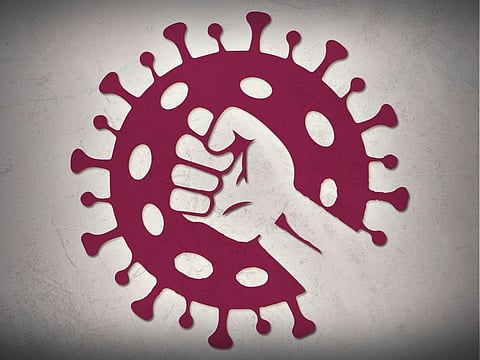When Omicron becomes a metaphor
Why man has been exposed, and repeatedly so throughout history, to the caprice of nature

I won’t lie to you: After close to two years of Covid, with all the attendant disruptions it had caused in our quotidian lives — all the ambient stress, all the existential despair, all the anxiety about whether the Grim Reaper would come knocking on our door or that of a loved one — the last thought on a columnist’s mind is to remind readers of the grim truth that a new and more contagious variant of the virus is building steam and, as we speak, spreading across every corner of our global village.
But there you have it. Grim truths declare their own form of being and cannot — should not — be ignored. This new variant, Omicron, is now the dominant strain, surpassing Delta in its ferocity.
In the US, scientists, who are racing to understand more about it, are in agreement that no part of the country will be safe from it. Last week, New York City alone averaged roughly 3,000 confirmed cases each day, up from a daily average of 1,800 over the previous 28 days. And it is sweeping throughout Europe at lightning speed, with Britain, the hardest hit on the continent, already facing what has been called a “tidal wave” of infections.
Nations in Africa, Asia and elsewhere have not fared any better. Worldwide, Omicron has already been located in 89 nations.
'The virus is not sick of us'
We may be sick of the virus, sick of the way it has upended our lives, sick of the suffering and destitution it has inflicted on us and, above all, sick of talking about it, but Francis S. Collins, director of National Health Institute (NHI) in Washington, told CBS News’s Face the Nation on Saturday, “The virus is not sick of us, and it is still out there looking for us”.
Dr. Collins was, of course, employing a metaphor to illustrate his point and clearly was not referring to a sentient creature with a consciousness. But if it is not that, then “what” is it?
True, things will get tougher and tougher in the coming weeks and months, but they will also get “curiouser and curiouser” once we move on to ask — as many of us will find themselves doing, if only at unguarded, anguished moments — teleological, perhaps even theological questions about the implications of this crisis that humanity, all together, is confronting at this juncture of its evolutionary continuum.
We cannot but ask questions, being the intellectually inquisitive humans we are created to be, about why man has been exposed, and repeatedly so throughout history, to the caprice of nature, and why every time it happened, it appeared as it were but a passing instant in the rational design of God’s purpose.
But I say that, over the sum of time, not only were the ways of God (ascribe to Him here whatever attributes you wish to align with your own particular faith) rational but He always made good on the havoc that He wrought upon us. There had been purpose, all along, to why we were made to endure irremediable suffering before our being was restored to grace.
Ashes of disaster
And how the devil, you ask, can one explain away the purpose of why, for example, Nature had men, women and children endure — to name but one of countless other calamities throughout human history — the terrors of the Black Death, a disastrous pandemic that spread in Europe between 1347 and 1351 and that wiped out half the continent’s population, or roughly 200 million people?
Well, consider how, from the ashes of that disaster — seemingly one beyond all rational understanding — a new dynamic Europe emerged, where feudalism had found its demise, Medieval peasants and labourers found their lives and working conditions dramatically improved and Europeans everywhere, energised by a new sense of élan, went on to discover new intellectual paradigms, nee social ideologies, new dazzling sciences and, yes, lest we forget, a New World.
This is but one, I say, among countless other calamities around the world where different human communities, faced by the dialectic of what the celebrated philosopher of history Arnold Toynbee called “challenge and response”, were provided with an opportunity to reassemble themselves and thrust their collective being beyond its fixed meaning.
Virtually all Holy Texts, including ours, tell of how every calamity in human existence is imbued with purpose and how that calamity’s end result was almost always to our benefit. In the Quran, for example, we are told in 94:5 to rest assured that after grief comes relief, or as the official English translation has it, “So surely, with hardship comes ease”. (Never mind that I encountered hardship feeling at ease with this rendition into English of the original verse.)
Francis S. Collins of the National Health Institute claimed that that the virus is not sick of us and is in fact still out there looking for us.
Fine. But as we hope that we do not fall sick with it, let’s equally hope that, as it insinuates itself into our public discourse, in the coming weeks and months, we do not get sick of exploring its teleological, indeed even is theological implications.
— Fawaz Turki is a journalist, academic and author based in Washington. He is the author of The Disinherited: Journal of a Palestinian Exile


